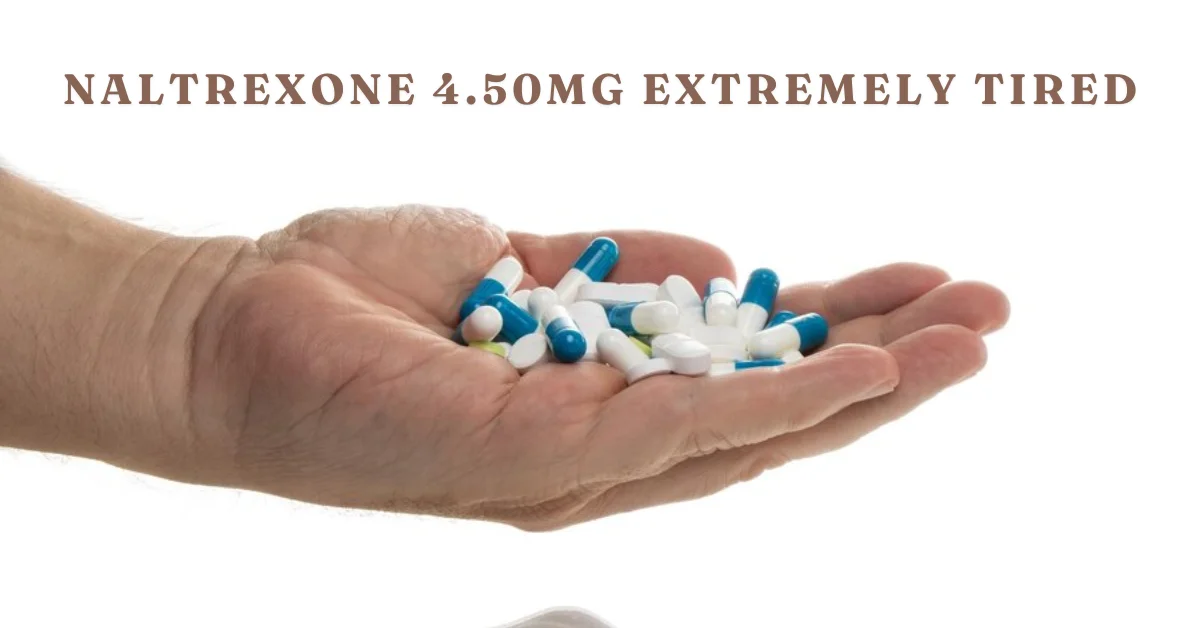Naltrexone is a medication often prescribed to individuals battling addiction, particularly to alcohol and opioids. At a dosage of 4.50 mg, it serves to reduce cravings and block the euphoric effects of these substances. While many find it beneficial in their recovery journey, one common complaint among users is extreme fatigue. In this article, we’ll explore the relationship between Naltrexone 4.50Mg Extremely Tired and tiredness, discussing its benefits, potential drawbacks, and strategies to manage fatigue effectively.
What is Naltrexone?
Naltrexone is an opioid receptor antagonist, which means it works by blocking the effects of opioids in the brain. It is often prescribed as part of a comprehensive treatment plan for individuals recovering from substance use disorders. The medication helps curb cravings and reduce the risk of relapse by neutralizing the pleasurable effects of alcohol and opioids. It is available in various forms, including oral tablets and injectable formulations.
Dosage
The typical starting dose for Naltrexone in treating alcohol dependence is 50 mg daily; however, some individuals may be prescribed lower doses like 4.50 mg to mitigate side effects or address specific medical conditions. Lower dosages are often more tolerable for patients, especially those new to the medication or with sensitivities to its effects.
Benefits of Naltrexone
The primary advantage of Naltrexone is its ability to aid individuals in their recovery from addiction. By blocking opioid receptors, it reduces the pleasurable effects of substances like alcohol and opioids, making them less appealing to the user. Some key benefits include:
- Craving Reduction: Naltrexone effectively diminishes cravings for alcohol and opioids, helping individuals stay committed to their recovery plans.
- Reduced Risk of Relapse: By neutralizing the euphoric effects associated with these substances, users are less likely to relapse, increasing their chances of long-term sobriety.
- Support for Behavioral Therapy: Naltrexone is most effective when combined with counseling and support groups, enhancing the overall treatment approach.
Side Effects
While Naltrexone offers significant benefits, it’s essential to consider the potential side effects. Fatigue is one of the most commonly reported issues. Other side effects may include:
- Nausea
- Headache
- Dizziness
- Insomnia
- Anxiety
Extreme tiredness can be particularly challenging for individuals already facing the emotional and physical toll of addiction. Understanding the reasons behind this fatigue can help users manage their symptoms effectively.
Why Does Naltrexone Cause Fatigue?
Fatigue is a complex symptom that can arise from various factors. In the case of Naltrexone, several potential mechanisms contribute to feelings of extreme tiredness:
- Neurochemical Changes: Naltrexone alters the balance of neurotransmitters in the brain, which can lead to changes in mood and energy levels. This adjustment may leave some individuals feeling fatigued as their bodies adapt.
- Withdrawal Effects: For those transitioning away from opioids or alcohol, the body may experience withdrawal symptoms, including fatigue. Naltrexone can exacerbate these feelings, making recovery even more challenging.
- Lifestyle Factors: Individuals recovering from addiction often lead unstable lifestyles that can contribute to fatigue. Poor sleep, lack of nutrition, and stress are common issues during this phase and can be intensified by the medication.
Managing Extreme Fatigue
If you are experiencing extreme tiredness while taking Naltrexone, several strategies can help manage this side effect effectively:
Sleep Hygiene
One of the most critical factors in combating fatigue is ensuring quality sleep. Here are some tips for improving sleep hygiene:
- Consistent Schedule: Aim to go to bed and wake up at the same time each day.
- Comfortable Environment: Create a relaxing sleep environment by keeping your bedroom dark, cool, and quiet.
- Limit Screen Time: Avoid screens (phones, TVs, tablets) at least an hour before bed to promote better sleep quality.
Nutrition
A well-balanced diet can significantly impact energy levels. Consider the following dietary tips:
- Hydration: Drink plenty of water to stay hydrated, as dehydration can contribute to fatigue.
- Balanced Meals: Incorporate a variety of foods, including fruits, vegetables, whole grains, and lean proteins, to ensure you’re getting the necessary nutrients.
- Avoid Stimulants: Limit caffeine and sugar, which can lead to energy crashes.
Physical Activity
While it may seem counterintuitive, engaging in regular physical activity can help combat fatigue:
- Moderate Exercise: Aim for at least 30 minutes of moderate exercise most days of the week. Activities like walking, swimming, or cycling can boost energy levels and improve mood.
- Gentle Stretching: Incorporating yoga or stretching into your routine can enhance relaxation and reduce stress, contributing to overall well-being.
Stress Management
Stress can exacerbate feelings of fatigue. Consider these stress-reducing techniques:
- Mindfulness and Meditation: Practicing mindfulness can help you stay grounded and focused, reducing feelings of anxiety and stress.
- Support Groups: Joining a support group for individuals in recovery can provide encouragement and understanding, alleviating feelings of isolation.
Consultation with Healthcare Provider
If fatigue persists or worsens, it’s crucial to consult your healthcare provider. They may:
- Adjust Your Dosage: Sometimes, a lower dose of Naltrexone can help mitigate side effects.
- Explore Alternatives: If Naltrexone is too burdensome, your doctor might suggest alternative medications or therapies.
- Rule Out Other Causes: Fatigue can sometimes stem from underlying health conditions, which should be assessed.
Conclusion
Naltrexone 4.50Mg Extremely Tired can be a valuable asset in the battle against addiction, significantly reducing cravings and supporting recovery. However, extreme fatigue is a common side effect that many users experience. Understanding the relationship between Naltrexone and tiredness is essential for effectively managing this challenge.
By implementing lifestyle changes, maintaining good sleep hygiene, focusing on nutrition, engaging in physical activity, and managing stress, individuals can better cope with the fatigue associated with Naltrexone. Always consult your healthcare provider if fatigue becomes unmanageable, as they can offer guidance and adjustments tailored to your needs. With the right support and strategies, you can navigate the recovery journey with more energy and optimism for the future.



